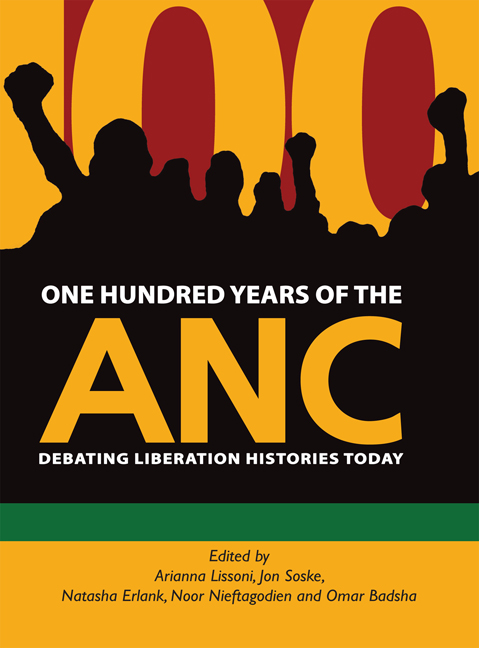Book contents
- Frontmatter
- Contents
- Acknowledgements
- Editorial Note
- FIRST KEYNOTE ADDRESS: Fragmentation and Cohesion in the ANC: The First 70 Years
- SECOND KEYNOTE ADDRESS: A Continuing Search for Identity: Carrying the Burden of History
- Chapter One One Hundred Years of the ANC: Debating Struggle History After Apartheid
- Chapter Two Religion And Resistance In Natal, 1900–1910
- Chapter Three Christianity and African Nationalism in South Africa in the First Half of the Twentieth Century
- Chapter Four Charlotte Maxeke: A Celebrated and Neglected Figure in History
- Chapter Five Imagining the Patriotic Worker: The Idea of ‘Decent Work’ in the ANC's Political Discourse
- Chapter Six Popular Movements, Contentious Spaces and the ANC, 1943–1956
- Chapter Seven Unravelling the 1947 ‘Doctors’ Pact’: Race, Metonymy and the Evasions of Nationalist History
- Chapter Eight The Politics of Language and Chief Albert Luthuli's funeral, 30 July 1967
- Chapter Nine Robben Island University Revisited
- Chapter Ten Shishita: A Crisis in the ANC in Exile in Zambia, 1980–811
- Chapter Eleven Comrade Mzwai
- Chapter Twelve Revisiting Sekhukhuneland: Trajectories of Former UDF Activists in Post-Apartheid South Africa
- Chapter Thirteen Regeneration of ANC Political Power, from the 1994 Electoral Victory to the 2012 Centenary
- Chapter Fourteen The ANC: Party Vanguard of the Black Middle Class?
- Chapter Fifteen Globalisation, Recolonisation and the Paradox of Liberation in Southern Africa
- Contributors
- Index
FIRST KEYNOTE ADDRESS: Fragmentation and Cohesion in the ANC: The First 70 Years
Published online by Cambridge University Press: 21 April 2018
- Frontmatter
- Contents
- Acknowledgements
- Editorial Note
- FIRST KEYNOTE ADDRESS: Fragmentation and Cohesion in the ANC: The First 70 Years
- SECOND KEYNOTE ADDRESS: A Continuing Search for Identity: Carrying the Burden of History
- Chapter One One Hundred Years of the ANC: Debating Struggle History After Apartheid
- Chapter Two Religion And Resistance In Natal, 1900–1910
- Chapter Three Christianity and African Nationalism in South Africa in the First Half of the Twentieth Century
- Chapter Four Charlotte Maxeke: A Celebrated and Neglected Figure in History
- Chapter Five Imagining the Patriotic Worker: The Idea of ‘Decent Work’ in the ANC's Political Discourse
- Chapter Six Popular Movements, Contentious Spaces and the ANC, 1943–1956
- Chapter Seven Unravelling the 1947 ‘Doctors’ Pact’: Race, Metonymy and the Evasions of Nationalist History
- Chapter Eight The Politics of Language and Chief Albert Luthuli's funeral, 30 July 1967
- Chapter Nine Robben Island University Revisited
- Chapter Ten Shishita: A Crisis in the ANC in Exile in Zambia, 1980–811
- Chapter Eleven Comrade Mzwai
- Chapter Twelve Revisiting Sekhukhuneland: Trajectories of Former UDF Activists in Post-Apartheid South Africa
- Chapter Thirteen Regeneration of ANC Political Power, from the 1994 Electoral Victory to the 2012 Centenary
- Chapter Fourteen The ANC: Party Vanguard of the Black Middle Class?
- Chapter Fifteen Globalisation, Recolonisation and the Paradox of Liberation in Southern Africa
- Contributors
- Index
Summary
In mid-2011 Gwede Mantashe, secretary-general of the African National Congress (ANC), chided the media for its preoccupation with splits in the party and asked the question: is the ANC no more than its fragments? That is a question which deserves serious attention and which, I believe, lies at the core of South African politics today. Are the ANC fragments – which definitely exist – destined, ultimately and decisively, to split apart, or is there some deeper source of cohesion, which, whatever the slices that shear away, will hold the wider body together?
Considering cohesion first, there seem currently to be two broad sources. The first is the immense resources of patronage which lie at the ANC's disposal. As we have seen in the past decade, however, this is very much a two-edged sword, where competition for control over such resources repeatedly threatens to break the ANC apart. The second, which, one might contend, is the real glue that holds the ANC together, is a history of struggle. This history of struggle has been mobilised repeatedly since 2004 to energise the ANC's base and hold competing factions together – and nowhere more so than in the party's centenary year, 2012 – but to which appeal is also constantly made by rival fragments or factions as they try to represent themselves as the authentic custodians of the ANC's past – and its struggle. What this means – and this is counter-intuitive in an age in which the youth has manifestly never been more uninterested in the past – is that history matters. This is obviously apparent in the Youth League's nationalisation programme, but also in the lionisation under the Mbeki administration of Pixley ka Isaka Seme as a prototype for African businessmen. This is a lesson which leaders of the more traditional rural sectors of our society have always comprehended – history is a key political resource. You cannot do without it, it has to be controlled.
What this is leading us towards, or has led us towards, is an explosion of amateur and instrumental history. At its extreme this can take us towards the gross deformities of what Terence Ranger has termed Patriotic History in Zimbabwe.
- Type
- Chapter
- Information
- One Hundred Years of the ANCDebating Liberation Histories Today, pp. 1 - 12Publisher: Wits University PressPrint publication year: 2012



